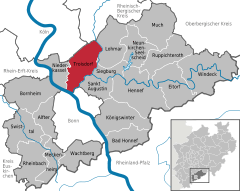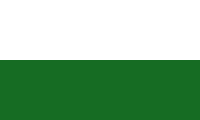Troisdorf
| Troisdorf | ||
|---|---|---|
|
Town hall of Troisdorf | ||
| ||
 Troisdorf | ||
Location of Troisdorf within Rhein-Sieg-Kreis district 
 | ||
| Coordinates: 50°48′58″N 07°09′20″E / 50.81611°N 7.15556°ECoordinates: 50°48′58″N 07°09′20″E / 50.81611°N 7.15556°E | ||
| Country | Germany | |
| State | North Rhine-Westphalia | |
| Admin. region | Köln | |
| District | Rhein-Sieg-Kreis | |
| Government | ||
| • Mayor | Klaus-Werner Jablonski (since October 2009) (CDU) | |
| Area | ||
| • Total | 62.17 km2 (24.00 sq mi) | |
| Population (2015-12-31)[1] | ||
| • Total | 74,400 | |
| • Density | 1,200/km2 (3,100/sq mi) | |
| Time zone | CET/CEST (UTC+1/+2) | |
| Postal codes | 53840, 53842, 53844 | |
| Dialling codes | 02241, 02203, 02246, 0228 | |
| Vehicle registration | SU | |
| Website | www.troisdorf.de | |
Troisdorf (German pronunciation: [ˈtroːsdɔrf]; Colognian: Trooßdoorf) is a town in the Rhein-Sieg-Kreis (district), in North Rhine-Westphalia, Germany.
Geography
Troisdorf is located approximately 22 kilometers south of Cologne and 13 kilometers north east of Bonn.[2]
Division of the town
Troisdorf consists of 12 districts (population as of April, 2014):[2]
- Troisdorf-Mitte (16,414 inhabitants)
- Altenrath (2,292 inhabitants)
- Bergheim (5,750 inhabitants)
- Eschmar (3,078 inhabitants)
- Friedrich-Wilhelms-Hütte (7,161 inhabitants)
- Kriegsdorf (3,129 inhabitants)
- Müllekoven (1,793 inhabitants)
- Oberlar (6,100 inhabitants)
- Rotter See (3,918 inhabitants)
- Sieglar (8,668 inhabitants)
- Spich (12,765 inhabitants)
- West (5,367 inhabitants)
- (total 76,435 inhabitants)
History
Troisdorf became a free city in 1952. In 1969, the urban area expanded with the annexation of the township of Sieglar and the villages of Altenrath and Friedrich-Wilhelms-Hütte (total population in 1969: about 51,000). The first large settlements in this area go back to the 9th and 10th century (Eschmar and Sieglar 832, Bergheim 987). The first churches in this area were built around 700 AD in Bergheim (St. Lambertus).
Troisdorf is home to about 9600 foreign nationals. The two most numerous foreign national groups are Turks (3100) and Greeks (1600). On June 4, 1972, Troisdorf founded the first advisory council for foreign citizens in Germany. In the years following the Peaceful Revolution and German reunification of 1989/1990 many migrants from Russia and other East European countries settled in Troisdorf.
On April, 2014, Troisdorf had a population of 76,435 according to official records.[2] 11% of the population are foreign migrants.
Troisdorf has a predominantly Christian population: Roman Catholics, Protestants, Baptists, Jehovah's Witnesses and other Christian denominations, along with Muslim, Orthodox Christian and Jewish populations of non-indigenous origin. Troisdorf is one of the German cities where its mosque includes a minaret, built for the local Islamic community.
Mayors
volunteers:
- 1969–1975: Josef Ludwig (CDU)
- 1975–1993: Hans Jaax (SPD)
- 1993–1998: Uwe Göllner (SPD)
- 1998–1999: Walter Bieber (SPD)
professionals:
Notable places
Europe's only picture-book museum is located in Troisdorf at the Burg Wissem castle.
Twin cities
 Évry, Essonne, Île-de-France, France, since 1972
Évry, Essonne, Île-de-France, France, since 1972.svg.png) Genk, Limburg, Belgium since 1990
Genk, Limburg, Belgium since 1990
 Heidenau, Saxony, Germany, since 1990
Heidenau, Saxony, Germany, since 1990 Redcar and Cleveland, England, United Kingdom, since 1990
Redcar and Cleveland, England, United Kingdom, since 1990 Corfu, Greece, since 1996
Corfu, Greece, since 1996 Nantong, Jiangsu, China, since 1997
Nantong, Jiangsu, China, since 1997 Mušutište, Serbia since 2001
Mušutište, Serbia since 2001 Özdere, Turkey since 2004
Özdere, Turkey since 2004
Notable persons
- John Siberch, pioneering printer and friend of Erasmus
- Tom Buhrow, German news anchor
- Lena Schöneborn, Olympic champion in Modern Pentathlon 2008
- Sabine Lisicki, German professional tennis player
- Rupert Neudeck, founder of the Cap Anamur, a German humanitarian aid organisation
- Paul Schäfer, founder Colonia Dignidad, a German sect in Chile
- Walter Stern, art critic and broadcaster
References
- ↑ "Amtliche Bevölkerungszahlen". Landesbetrieb Information und Technik NRW (in German). 18 July 2016.
- 1 2 3 "Willkommen in Troisdorf / Zahlen – Daten – Fakten" (PDF) (in German). Town of Troisdorf. p. 3. Retrieved 25 March 2015.
External links
- Official website (English)
- Official website (German)

